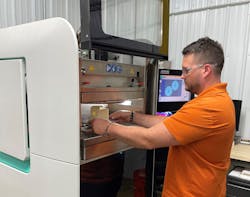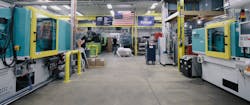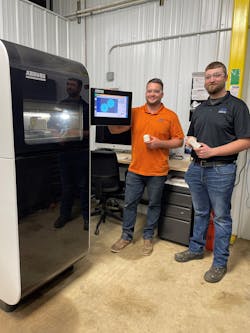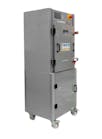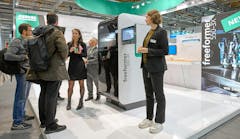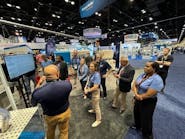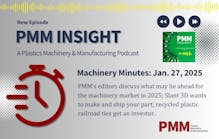Arburg Freeformer delivers prototypes with end-quality properties
Problem: Parker Hannifin set out to test designs for a new product, but the prototypes needed to be made from a resin that would approximate the performance of the end product while keeping costs down.
Solution: Parker turned to the Freeformer 3-D printer, using a nylon from Arburg that is analogous to the resin chosen for the intended final product.
By Karen Hanna
A meeting between representatives of Arburg and a multibillion-dollar motion and controls manufacturing giant led to business for a small molder in Michigan that is still identifying possible applications for its new Freeformer printer.
“We have our own kind of 3-D printing [technologies], and it has its advantages, but there are some limitations based on the materials available,” said Mike Vercammen, a design engineer at Parker, which was seeking to test designs fora new product. “When we talked with those guys with Arburg, they had a nylon material that’s very similar to what we make plastic end caps [out of].”
The project involved a cap and fuel filter for an agricultural product. Parker was looking to possibly mold the product from Nylon 6 or Nylon 6/6, but the Freeformer can run Nylon 10, which is close enough.
“That led us in that direction, to at least try them out,” Vercammen said.
In addition, Parker was looking to avoid the costs and time in making tooling — especially for a prospective product in its early stages.
“We use other prototype companies in shops that do soft tooling or low-volume tooling, but there’s still an upfront cost in the lead time that, especially now during the pandemic, cost is a very, very sensitive matter,” Vercammen said. “When you can do something that’s, basically, you’re paying for the material, and there’s no tooling involved, that’s going to be a positive advantage.”
Cost, material and time advantages — along with an endorsement from Arburg — brought Parker together with PDS Plastics, a company with about a dozen employees based in Dorr, Mich.
Since purchasing its Freeformer about two years ago, PDS Plastics has been exploring ways to help shepherd customers in the earliest stages of product development, said Zack Demaray, head of operations. Calling the Freeformer “a good selling point for us,” he sees the technology as another tool to reel in business.
“And we’ll take it from a napkin sketch to a final part and help them through the whole process. I think it has helped us on some occasions, pulling in customers that maybe would have gone to somebody that was a product development house, rather than an injection molder,” Demaray said.
Vercammen has worked for Parker for 17 years but had never previously interacted with PDS Plastics. He said the experience was a positive one.
“We set up a meeting about the opportunity, and they were very excited about doing it, and we were excited to see what they could do. So, they stepped up and showed us their capabilities and gave us sample parts to look at, and we had positive results,” Vercammen said. “It was a good experience with them.”
In all, the project took a few weeks, with the first conversations beginning in December 2020 and the decision to print parts coming in mid-
January. The turnaround would have been possible with tooling, as well — but only at a premium price, Vercammen said.
“Using them allowed us to do on-the-fly changes, if needed. And we didn’t have to use upfront capital to do a tool, which takes a lot of upfront cash and a lot of time, and if you’ve had to make changes, and there’s that extra added time. So, using them for this was a cost-efficient way to do the prototype upfront,” he said.
Being able to use a material that approximates the properties of the intended end product was important to the project, Vercammen said.
“Nylon is a commonly used plastic for components that would be exposed to fuels because of their acceptable chemical compatibility,” he said.
According to Arburg, the Freeformer can use standard plastics pellets, rather than extruded filaments like other 3-D printers, to print fully functional parts from a growing portfolio of plastics.
For Demaray, the project is a window into the new types of business PDS Plastics could score with its foray into printing. The company, which also provides tooling services, now prints about 75 percent of first-run parts for its new customers. Being able to offer a quick and cost-effective way to prototype gives PDS Plastics another angle to grow its business.
“I guess the way I would put it is, it’s very handy to have when you need it. And it has helped us, I think, expand customer relationships. And the ability to work with somebody either in really, really low volume, and build a quality part at a really low volume, or help them prototype their parts and take them through the product-development phase,” Demaray said. “Because we will work with people doing that, as well. Concept to reality.”
Karen Hanna, senior staff reporter
Karen Hanna | Senior Staff Reporter
Senior Staff Reporter Karen Hanna covers injection molding, molds and tooling, processors, workforce and other topics, and writes features including In Other Words and Problem Solved for Plastics Machinery & Manufacturing, Plastics Recycling and The Journal of Blow Molding. She has more than 15 years of experience in daily and magazine journalism.
